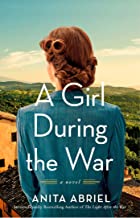A Girl During the War by Anita Abriel; New York: Atria Books © 2022; ISBN 9781982-181185; 317 pages; $17.

 SAN DIEGO – Many people have asked themselves if they had lived under the Hitler regime, and if they weren’t Jewish, would they have had the courage to protect a Jew, knowing if they were caught that they and their families would be executed by the Nazis.
SAN DIEGO – Many people have asked themselves if they had lived under the Hitler regime, and if they weren’t Jewish, would they have had the courage to protect a Jew, knowing if they were caught that they and their families would be executed by the Nazis.
I think regardless of which way someone decided this issue, it would be a time of agonizing self-conflict between one’s desire for self-preservation versus living up to one’s sense of moral duty to fellow human beings.
That’s why I was surprised by the protagonist in this novel, Marina Tozzi, who found her father and a Jewish man whom he had been hiding murdered together in the cellar of her home. Thereafter, she escaped from Rome to a Tuscan villa outside of Florence, to which she was invited by a wealthy American who often had purchased art from her father’s gallery.
When a young man who lived in a nearby villa asked her to become involved with partisans who were hiding Jewish families, Marina agreed, almost without a single doubt.
Yet, when the same young man, Carlos, sought to date her, she was much more hesitant, even anguished, about whether she should accept his invitation. She had dated another man in Rome, who had proven himself to be a thief. What if Carlos turned out to be just as bad?
Somehow, it didn’t ring true to me that Marina could be so nearly paralyzed over a decision to date another handsome man and yet be so blasé about putting her life at risk by helping a Jewish mother and her two children who were in hiding.
The wealthy man who gave her sanctuary was Bernard Berenson, the real-life art historian whose villa, art library, and paintings eventually were donated to Harvard University, becoming known as the Harvard Center for Italian Renaissance Studies. While Berenson was a real person, whose biography author Abriel clearly had studied, the character Marina Tozzi is fictional.
Berenson has Marina working in his private library of more than 300,000 volumes, helping to catalogue works about art, including some rare manuscripts from the Renaissance. The pleasant work is interrupted by dinners, shopping trips, picnics, visits to neighbors – hardly a typical World War II experience.
In addition to aiding the sequestered Jewish family, Marina agrees to estimate the value of art pieces that the partisans have acquired to finance provisions for the hidden Jews and to pay for clandestine operations to smuggle Jews across the border of neutral Switzerland.
The plot of this book is interesting, but in the opinion of this reviewer, the novel needs deeper examination of the principal characters’ motivations and ideals.
*
Donald H. Harrison is editor emeritus of San Diego Jewish World. He may be contacted via donald.harrison@sdjewishworld.com